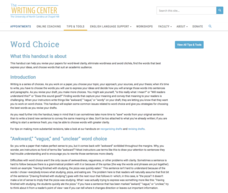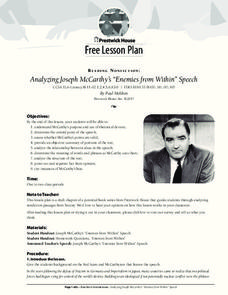Learning for Justice
Maya Angelou
Maya Angelou's poem, "Still I Rise", offers young scholars an opportunity to consider how poets use literary devices to create powerful messages. After a close reading and discussion of the poem, class members reflect on how they can...
University of North Carolina
Word Choice
Words matter, particularly in academic writing. Issues such as vague language, wordiness, and cliches make it difficult to get a point across. Part of a larger series to improve writing skills, the handout on word choice shows writers...
University of North Carolina
Clichés
When it comes to writing, cliches are as old as dirt. A handout on tired phrases provides examples of cliches, as well as a description of the negative effects they have on a paper. Writers discover specific words and phrases to avoid,...
California Federation of Chaparral Poets, Inc
Poetic Devices
Have everything you need to know about the elements of poetry with a nine-page handout. Split into four categories—word sounds, meanings, arrangement, and imagery—budding poets may reference terms, read definitions, descriptions, and...
Prestwick House
Reading Nonfiction: Analyzing Joseph McCarthy's "Enemies from Within" Speech
Looking for a lesson plan that teaches class members how to analyze nonfiction? Use Joseph McCarthy's famous "Enemies from Within" speech as a instructional text. Worksheet questions direct readers' attention to the many historical...
BW Walch
“Outsider” Poet Kay Ryan Goes from Poetry Club Reject to Poet Laureate
The cat might have got your tongue, but you can’t avoid the elephant in the room while you wait for the other shoe to drop. After all, the early bird gets the worm and the chickens are circling. After researching Poet Laureate Kay Ryan...
Curated OER
Improving Descriptive Writing: Painting an Original Picture
Descriptive writing is rich in sensory appeals and paints pictures in the minds of readers. Show young writers how to use an on-line thesaurus and a cliché website to create fresh, descriptive writing. The presentation ends with an...
Curated OER
Comics for the Classroom: Debt Ceiling
Upper graders examine the clichés that accompany this political cartoon, depicting how various people handle the national debt. They review several clichés quoted in recent times and write a 1-2 paragraph analysis of each.
Curated OER
Errors vs. Rhetorical Devices
Is there a difference between writing errors and employing rhetorical devices? This presentation argues that there is a difference, but it might be a finer point than one would think. Addressing double entendre, oxymorons, and parody,...
Curated OER
Trite Expressions Worksheet 1
In this grammar worksheet, students read twenty sentences to find the trite expression in each one and then think of a creative way to rephrase it.
Curated OER
Usage and Stigmatization
Reinforce usage and proper grammar with this presentation, which addresses common grammatical mistakes. It covers instances of bad usage in literature, cliches to avoid, and the increase of errors in the computer generation. The final...
Curated OER
Cartoons in the Classroom: Visual Clichés
In this current events worksheet, students analyze political cartoons featuring the use of clichés. Students respond to 2 talking point questions.
Curated OER
Social Studies: Parent - Teen Relationships
Learners discuss the characteristics and responsibilities associated with parent - teen relationships. They compose lists of issues they have with their parents and explain how they feel about them. In groups, students write lists of...














